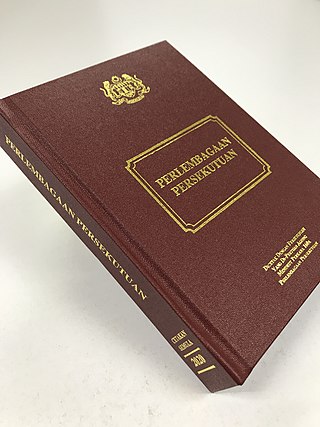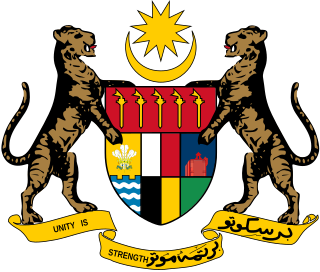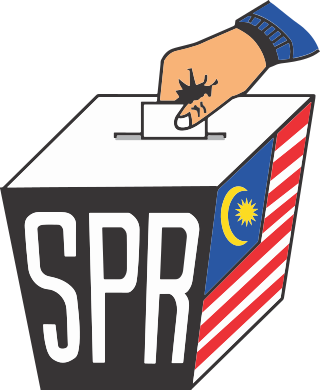Related Research Articles

Freedom of peaceful assembly, sometimes used interchangeably with the freedom of association, is the individual right or ability of people to come together and collectively express, promote, pursue, and defend their collective or shared ideas. The right to freedom of association is recognized as a human right, a political right and a civil liberty.

The Dewan Rakyat is the lower house of the bicameral Parliament, the federal legislature of Malaysia. The chamber and its powers are established by Article 44 of the Constitution of Malaysia. The Dewan Rakyat sits in the Houses of Parliament in Kuala Lumpur, along with the Dewan Negara, the upper house.

The Federal Constitution of Malaysia, which came into force in 1957 as the Constitution of the Federation of Malaya and was amended in 1963 to form the Constitution of Malaysia, is the supreme law of Malaysia and contains a total of 183 articles. It is a written legal document influenced by two previous documents, the Federation of Malaya Agreement 1948 and the Independence Constitution of 1957. The Federation was initially called the Federation of Malaya and it adopted its present name, Malaysia, when the states of Sabah, Sarawak and Singapore became part of the Federation. The Constitution establishes the Federation as a constitutional monarchy, having the Yang di-Pertuan Agong as the Head of State with largely ceremonial roles. It provides for the establishment and organisation of three main branches of the government: the bicameral legislative branch called the Parliament, which consists of the House of Representatives and the Senate ; the executive branch led by the Prime Minister and his Cabinet Ministers and the judicial branch headed by the Federal Court.
The states and federal territories of Malaysia are the principal administrative divisions of Malaysia. Malaysia is a federation of 13 states (Negeri) and 3 federal territories.
An entrenched clause or entrenchment clause of a constitution is a provision that makes certain amendments either more difficult or impossible to pass. Overriding an entrenched clause may require a supermajority, a referendum, or the consent of the minority party. The term eternity clause is used in a similar manner in the constitutions of Brazil, the Czech Republic, Germany, Greece, India, Iran, Italy, Morocco, Norway, and Turkey, but specifically applies to an entrenched clause that can never be overridden. However, if a constitution provides for a mechanism of its own abolition or replacement, like the German Basic Law does in Article 146, this by necessity provides a "back door" for getting rid of the "eternity clause", too.

A secular state is an idea pertaining to secularity, whereby a state is or purports to be officially neutral in matters of religion, supporting neither religion nor irreligion. A secular state claims to treat all its citizens equally regardless of religion, and claims to avoid preferential treatment for a citizen based on their religious beliefs, affiliation or lack of either over those with other profiles.

The Dewan Negara is the upper house of the Parliament of Malaysia, consisting of 70 senators of whom 26 are elected by the state legislative assemblies, with two senators for each state, while the other 44 are appointed by the Yang di-Pertuan Agong, including four who are appointed to represent the federal territories.

The Constitution of the Republic of Singapore is the supreme law of Singapore. A written constitution, the text which took effect on 9 August 1965 is derived from the Constitution of the State of Singapore 1963, provisions of the Federal Constitution of Malaysia made applicable to Singapore by the Republic of Singapore Independence Act 1965, and the Republic of Singapore Independence Act itself. The text of the Constitution is one of the legally binding sources of constitutional law in Singapore, the others being judicial interpretations of the Constitution, and certain other statutes. Non-binding sources are influences on constitutional law such as soft law, constitutional conventions, and public international law.

Malaysian nationality law details the conditions by which a person is a citizen of Malaysia. The primary law governing nationality requirements is the Constitution of Malaysia, which came into force on 27 August 1957.

The Election Commission of Malaysia, abbreviated SPR or EC, is a commission set up for ensuring fair and equitable operations in undertaking the elections in Malaysia. The agency falls under the purview of the Prime Minister's Department.
The basic structure doctrine is a common law legal doctrine that the constitution of a sovereign state has certain characteristics that cannot be erased by its legislature. The doctrine is recognised in India, Bangladesh, Pakistan, and Uganda. It was developed by the Supreme Court of India in a series of constitutional law cases in the 1960s and 1970s that culminated in Kesavananda Bharati v. State of Kerala, where the doctrine was formally adopted. Bangladesh is perhaps the only legal system in the world which recognizes this doctrine with an expressed, written and rigid constitutional manner through article 7B of its Constitution.

The Conference of Rulers in Malaysia is a council comprising the nine rulers of the Malay states, and the governors of the other four states. It was officially established by Article 38 of the Constitution of Malaysia, and is the only such institution in the world, according to the Malaysian National Library.
The Sedition Act 1948 in Malaysia is a law prohibiting discourse deemed as seditious. The act was originally enacted by the colonial authorities of British Malaya in 1948 to contain the local communist insurgence. The act criminalises speech with "seditious tendency", including that which would "bring into hatred or contempt or to excite disaffection against" the government or engender "feelings of ill-will and hostility between different races". The meaning of "seditious tendency" is defined in section 3 of the Sedition Act 1948 and in substance it is similar to the English common law definition of sedition, with modifications to suit local circumstances. The Malaysian definition includes the questioning of certain portions of the Constitution of Malaysia, namely those pertaining to the Malaysian social contract, such as Article 153, which deals with special rights for the bumiputra.
The local government in Malaysia is the lowest tier of government in Malaysia administered under the states and federal territories which in turn are beneath the federal tier. Local governments are generally under the exclusive purview of the state governments as provided in the Constitution of Malaysia, except for local governments in the federal territories. The federal Ministry of Local Government Development plays a role in co-ordinating and standardising the practices of local governments across the country.

The 18-point agreement, or the 18-point memorandum, was a purported list of 18 points drawn up by Sarawak, proposing terms to form Malaysia, during negotiations prior to the creation of the new federation in 1963. Unlike the Sabah's 20-point memorandum whose authors are known and well documented, no such details have been produced for the so-called Sarawak 18-points memorandum.

The premierof Sarawak is the head of government of the Malaysian state of Sarawak. The premier is appointed by the Yang di-Pertua Negeri (Governor) of Sarawak. The premier is also the leader of the political party or coalition that secures a majority in the Sarawak State Legislative Assembly.

On 4 April 2019, a bill proposing an amendment to the Constitution of Malaysia was tabled in the Dewan Rakyat of the Parliament of Malaysia. The bill proposes to amend Article 1(2) so as to restore the status of the two East Malaysian states of Sabah and Sarawak according to the original content of Malaysia Agreement that was signed in 1963.

The Constitution (Amendment) Act 2022 amended the Constitution of Malaysia to restore Sabah and Sarawak as equal partners to Malaya in Malaysia. This was intended to give effect to the Malaysia agreement of 1963. It was passed unanimously by the Dewan Rakyat on 14 December 2021 and came into effect after receiving royal assent on 11 February 2022.